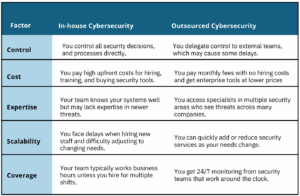Many organizations are turning to outside cybersecurity experts to protect their digital assets. But is outsourced cybersecurity the right choice for your business? Keep reading to learn what cybersecurity outsourcing is, its benefits and limitations, and how to determine if it fits your organization’s security needs.
What Is Cybersecurity Outsourcing?
Cybersecurity outsourcing is the process of hiring external security specialists to manage your organization’s digital protection rather than building an in-house team. When you outsource cybersecurity, you gain access to security experts who bring specialized skills, tools, and resources to help you defend against current and emerging threats.
Outsourced services typically include:
- Managed security monitoring (MSSPs) that offer 24/7 threat detection
- Security Operations Centers (SOCs) that provide centralized threat protection without the need to build in-house infrastructure
- Vulnerability management services that identify and fix weaknesses
- Penetration testing, which simulates real-world attacks
Additionally, many outsourced cybersecurity providers offer security awareness training, compliance management for regulatory requirements like GDPR or HIPAA, incident response support during breaches, and virtual CISO services for strategic guidance.
Organizations take advantage of cybersecurity outsourcing for various reasons:
- Small businesses turn to outsourced cybersecurity to gain enterprise-level security capabilities without the high costs of building internal teams.
- Mid-market companies often implement a hybrid approach to cybersecurity, maintaining some security functions in-house while outsourcing specialized needs.
- Larger enterprises use outside experts to fill specific capability gaps in their security programs, while organizations in heavily regulated industries work with specialized partners to ensure compliance.
Pros and Cons of Cybersecurity Outsourcing
Before outsourcing your cybersecurity, take time to weigh both the benefits and the possible risks. Here’s what you should know before making your decision.
Pros
The benefits of outsourcing cybersecurity are numerous and include:
- Access to specialized talent: Outsourcing cybersecurity lets you immediately access security professionals with specialized skills and experience that might be difficult to find — or expensive to hire directly. With a projected 3.5 million cybersecurity vacancies by 2025, organizations face increasing difficulty attracting top talent.
- 24/7 monitoring and faster incident response: Most organizations can’t afford the substantial investment needed for 24/7 in-house security coverage. Regardless of time or staffing availability, round-the-clock threat detection and response is a key benefit of outsourced security.
- Cost efficiency: For most small and medium-sized businesses, outsourcing is more affordable than building an internal security team. Outsourcing your cybersecurity lets you avoid costs related to recruiting and training, providing salaries and benefits, and maintaining advanced security tools and infrastructure.
- Scalability and flexibility: Outside security service providers can help you be more agile, allowing you to adjust protection levels as your business needs change quickly. Your systems and networks stay protected even as you expand to new locations, add services, or experience seasonal traffic fluctuations.
Cons
Despite these benefits, outsourcing cybersecurity does come with potential challenges:
- Reduced control and visibility: When you outsource, you inherently give up some control over your security tools, processes, and day-to-day operations. You may also have less visibility into how your security is managed.
- Potential vendor lock-in or service gaps: Some providers may not offer comprehensive coverage for all your security needs — or you may find it difficult to switch providers once you’ve integrated with their systems and processes.
- Communication challenges: Working with an external team could lead to delays in communication or misunderstandings about priorities and expectations. Cultural or time zone differences can exacerbate these issues.
- Dependency risks: What happens if your cybersecurity provider has a service disruption or goes out of business? Relying heavily on a single external provider can create business continuity risks.
The best approach to cybersecurity depends on your organization’s specific needs, size, industry, and existing security capabilities. Many companies find that a hybrid model — keeping some security functions in-house while outsourcing others — provides the right balance of expertise, control, and cost-effectiveness.
In-House vs Outsourced Cybersecurity: What’s Better for You?
Choosing between in-house and outsourced cybersecurity requires more than a cost comparison; it involves aligning with your organization’s unique security requirements. Here’s what else to consider:

In-House or Outsourced? Making the Right Choice
Not sure if in-house or outsourced security makes more sense for your business? Here’s how to make an informed decision.
Consider in-house when:
- Your industry requires tight control over security operations
- You have an ample budget for competitive salaries, ongoing training, and security tools.
- You can support a team of at least three to five security professionals
Consider outsourcing when:
- You lack resources for a fully-staffed security team and security tools
- You need to implement robust security quickly
- You need specialized expertise for compliance requirements
Many organizations find their sweet spot with a hybrid approach. They maintain internal control over security governance and strategy while partnering with specialists for 24/7 monitoring, threat hunting, and incident response.
How Outsourcing Helps Solve Key Cybersecurity Challenges
A shortage of skilled professionals is straining the cybersecurity field. Gartner projects that over half of major incidents will stem from talent gaps or human errors. Threats are getting more sophisticated, and organizations struggle to find qualified security professionals.
Outsourcing your cybersecurity closes the talent gap and fills in-house limitations by giving you immediate access to security expertise without recruiting and hiring expensive in-house staff. Security providers offer specialized solutions like:
- Managed Detection and Response (MDR): Provides continuous 24/7 network monitoring without building and staffing your own security operations center.
- Penetration testing: External experts simulate attacks and identify vulnerabilities before hackers can exploit them.
- Cloud security management: Secures your complex multi-cloud environments that require specialized expertise.
- Security program development: Implements comprehensive security frameworks for organizations lacking internal resources.
- Compliance management: Helps you meet industry regulations like HIPAA or GDPR without needing to maintain specialized compliance experts on your staff.
Can Outsourcing Actually Improve Your Cybersecurity?
Many organizations wonder if outsourcing security can strengthen their protection rather than just maintain it. The evidence says yes. Organizations with security automation in place tend to reduce breach costs by $2.2 million, according to IBM’s Cost of a Data Breach Report.
When partnering with a cybersecurity specialist, you gain numerous advantages — including broader threat intelligence, advanced technology access, specialized expertise, and an objective perspective. And these advantages translate to measurable improvements. Organizations working with experienced MSSPs typically see faster threat detection, more comprehensive coverage, and improved compliance postures than those relying solely on in-house capabilities.
How to Choose the Right Cybersecurity Partner
The cybersecurity partner you choose directly impacts your organization’s security posture. Use these criteria to evaluate potential providers.
Evaluation Checklist
When assessing cybersecurity service providers, consider these factors:
- Industry certifications: Choose a provider whose teams hold relevant certifications like CISSP, CISM, CEH, or CompTIA Security+. Organizational certifications such as SOC 2 Type II prove their commitment to security.
- Service Level Agreements: Examine response time guarantees and remediation commitments. Insist on strong SLAs; these define what happens during incidents and hold your provider accountable.
- Experience in your industry: Partner with a company that has experience protecting similar organizations. They should understand your compliance requirements and typical threats.
- Transparency and communication: Demand clear reporting, regular security reviews, and straightforward communication. Evaluate how they explain complex issues and provide actionable recommendations.
- Technology stack: Review the tools and platforms they use. Leading providers use advanced technologies like AI-enhanced threat detection and comprehensive SIEM solutions.
- References and case studies: Ask for client references and review case studies. A frank conversation with a current client can give you insights into what to expect.
Red Flags to Watch For
As you’re evaluating your options, avoid cybersecurity providers that display these red flags:
- They promise “complete protection” or make absolute security guarantees — companies that do this are setting an unrealistic expectation
- They can’t clearly explain their incident response process
- They aren’t willing to disclose information about their own security practices
- Their pricing is unusually low pricing without a clear explanation of service differences
- They offer a set package of offerings and refuse to customize their approach to your needs
- They experience high staff turnover
Finding the Right Match
To find the right outsourced cybersecurity partner, choose a provider who takes the time to understand your business before recommending solutions. The best cybersecurity partners treat security as an ongoing program rather than a product. Xantrion demonstrates this approach by conducting thorough security assessments before proposing solutions, maintaining clear communication, and offering flexible services that grow with your organization.
Final Thoughts: Should You Outsource Cybersecurity?
Should you outsource your organization’s cybersecurity? The short answer is it depends. When evaluating your options, consider your budget constraints, internal capabilities, risk tolerance, and industry requirements. Evaluating these factors alongside the benefits and drawbacks of outsourcing can help you choose the right path for your organization.
Ready to explore how outsourced cybersecurity could benefit your organization? Xantrion’s free 5-minute cyber assessment can help you identify your security posture, showing you areas for improvement. Take the assessment now.
Frequently Asked Questions
What are the most commonly outsourced cybersecurity tasks?
The most commonly outsourced cybersecurity tasks include 24/7 security monitoring, incident response, vulnerability management, and penetration testing. Many organizations also outsource security awareness training, compliance management, and virtual CISO services.
How much does it cost to outsource cybersecurity?
Cybersecurity outsourcing costs typically range from $1,500 to $5,000 per month for small businesses and $5,000 to $15,000+ for mid-sized organizations, depending on services included and company size. The cost depends on the services you need, how complex your environment is, and the level of protection you’re looking for.
What are the risks of outsourcing cybersecurity?
The main risks of outsourcing cybersecurity include potential loss of control over security operations, dependency on a third party, and possible communication challenges during incidents. Your organization may also face vendor lock-in or service gaps if the provider’s capabilities don’t fully align with your changing security needs.
What are the benefits of outsourcing cybersecurity?
Outsourcing cybersecurity provides access to specialized expertise, 24/7 protection, and advanced security technologies — without the high costs of building an internal team. Your organizations can benefit from faster threat detection, improved compliance posture, and the ability to quickly and easily scale security resources.
Who should consider cybersecurity outsourcing?
Outsourced cybersecurity is likely a good fit for your organization if you have limited internal security resources, have struggled to hire qualified security professionals, or need specialized expertise. Businesses in highly regulated industries — and those experiencing growth outpacing their security capabilities — may also benefit from outsourced cybersecurity services.
What’s the difference between managed IT and outsourced cybersecurity?
Good question! Managed IT services focus on general technology operations and support, while outsourced cybersecurity addresses security threats, vulnerabilities, and compliance. While a managed IT provider may maintain systems and handle basic security measures, a dedicated cybersecurity provider offers specialized expertise in threat detection, incident response, and advanced security functions.

